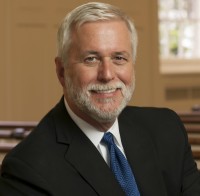A response to "Paper Chase" Case by case: Case by case

Read Ellen Blue's fictional narrative first.
Conflict is neither good nor bad. It is just inevitable, and it’s another tool for leadership. Jesus Christ started most of the ones he experienced, so why should his faithful disciples expect to avoid them? The challenge for a leader of Christ’s church is to make a conflict redemptive.
Larry likes to think of himself as a pastor devoted to “empowerment.” That sounds good these days. For a long time we have chaffed at the old hierarchical, top-down forms of organizational leadership. We now expect enlightened pastors to free the gifts and passions of their parishioners, and we assume that the Holy Spirit will use all of this energy to build up the church into a harmonious whole. But there is little biblical warrant to support such a naïve assumption.
Read our latest issue or browse back issues.
We first meet the Spirit, or holy ruach of God, in the opening verses of the Bible when a great heavenly wind moved over the waters, shoving the dark chaos aside to create light and beauty in its place. When Jesus presented his credentials for ministry, he claimed that this same Spirit had anointed him to preach good news to the poor, which was a way of again shoving aside the chaotic world order created by the rich. After Jesus’ ascension, the Spirit enflamed Jesus’ disciples with a passion for the gospel at Pentecost, and the scene was anything but controlled and orderly. And then these disciples, who were now apostles, began a missionary enterprise that was “turning the world upside down” (Acts 17:6). Apparently, the Holy Spirit finds chaos and conflict to be a preferred working environment.
So the mission of the pastor is not to avoid conflict but to look for the ways that the Holy Spirit is at work within it. Frequently, the empowering pastor is using a faddish job description to avoid needed conflicts in the church or to blame them on a creative associate pastor or elder. But even if Larry succeeded in relieving the tensions of inevitable conflicts for a while, it would only be a futile effort to push away the Holy Spirit. The conflicts would still occur. That’s because God will not abandon the church to our management strategies.
In order for a conflict to be redemptive within the congregation, it is helpful if the pastor has at least a hunch about the real issue. It would be easy if Stan’s real angst had anything to do with what a young pastor thinks about the paper industry, but that is doubtful. Had the Earth Day project of washing dishes at the church occurred when Stan was still in a management position in the industry, I doubt that he would have given it little more than a dismissive smile and then returned to his busy schedule.
Stan’s real conflict these days is that he no longer has a busy schedule that he deems worthy of his expertise. A man who used to direct decisions that involved millions of dollars is now having to hurry to pick up his wife from the hairdresser in order to help her buy a lamp. It takes a heroic effort for Stan to admit that his importance is not tied to being a manager of industry; it takes a heroic effort to admit that in the course of his entire marriage he never did anything more important than be by the side of his wife when she picked out a new lamp for their home. If Stan is going to rise to such heroism, the Holy Spirit is going to have to move over the chaos of his retirement.
The real job of Stan’s pastors is to help him see the holiness of his ordinary routines. The most confessional thing Stan told Larry was not his objection to the Earth Day project, but his expression of frustration that his job in life is now picking up his wife from the hairdresser and then helping her furnish their house.
The reality is that such domestic homebuilding work was always far more important than anything he ever did for the corporation that made cardboard boxes. We all live with many callings in life, and the way we make our money is hardly the highest one.
Stan was created to glorify and enjoy God. His inability to find a cause worthy of his résumé after retirement, and the silly conflict he’s trying to create over the youth group project, indicate that he is flailing about. He’s trying to find a calling worthy of his life, a calling from which he’ll never have to retire.
The last thing that will be helpful for Stan is for his pastor to become fearfully reactive and put the breaks on Stephanie’s creative work in the church. What Stan needs from both Larry and Stephanie are pastors who have aspirations for his life with God—and higher aspirations for their own work than servicing complaints.
So what does Pastor Larry say to Stan at their next appointment? My suggestion is that he start by letting Stan ramble on a bit more about the Earth Day project. Not only should Larry not be defensive, he should also occasionally nod to indicate that he understands the complaint. But when the time is right, Larry should pause, lean forward and gently change the subject by saying something like, “You seemed upset a couple of days ago when you had to run out to help your wife buy a lamp. Tell me some more about that.” The chances are great that Stan will then reveal his real anxiety.
And what does Larry say to the young associate pastor to encourage her ministry after it has come under attack? He can explain the difference between texts and subtexts, and he should note that Stan’s real issue has nothing to do with her project. But that’s not hard. The more difficult thing Larry has to tell her is: “Welcome to church ministry. There’s always messy chaos here, and apparently that’s how the Holy Spirit likes it.”






